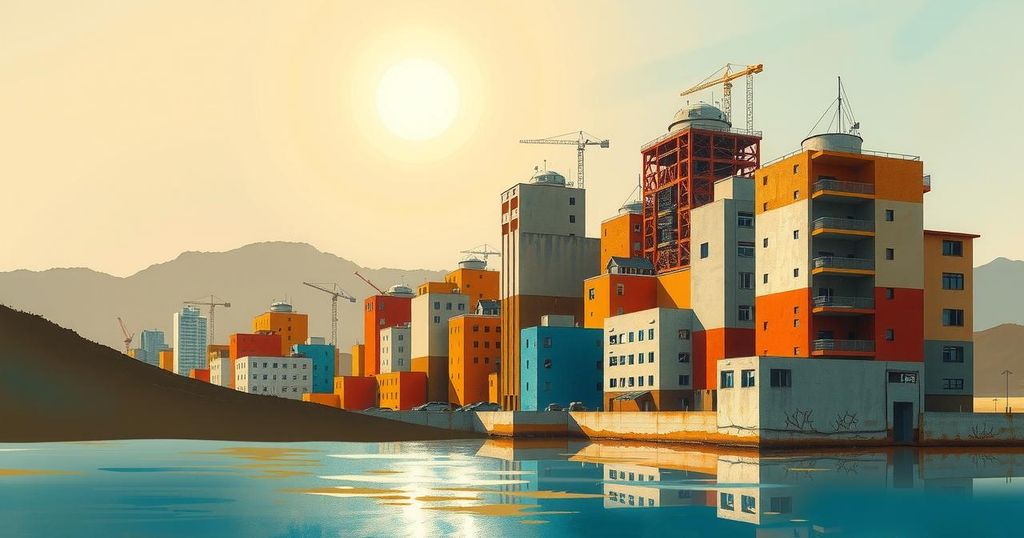Weiser Diplomacy Center Explores Syria’s Post-Civil War Reconstruction Challenges
The Weiser Diplomacy Center hosted a discussion on Syria’s reconstruction featuring experts who analyzed the ramifications of the civil war, the challenges facing the new government, and the necessity for international support. Key points included the civil war’s toll on Syria’s population, the emergence of self-governing institutions, and the controversial sanctions affecting recovery efforts amid calls for a change in U.S. policy.
The University of Michigan’s Weiser Diplomacy Center hosted an insightful discussion on post-civil war reconstruction in Syria, featuring Qutaiba Idlbi, a senior fellow at the Atlantic Council’s Middle East Programs, and Dr. Abdalmajid Katranji of Michigan State University. The speakers examined the challenges stemming from the 14 years of civil war, emphasizing the current state-building strategies of the new Syrian government led by Ahmed al-Sharaa, the successor to Bashar al-Assad, who fell from power on December 8, 2024.
The impact of the Syrian civil war has been catastrophic, leading to significant brain drain, with half of Syria’s educated populace forced to leave. Idlbi remarked on this dire situation, stating, “There’s a lot for Syrians to rebuild; half of Syria has left the country. So I think this is one of the biggest brain drains that we’ve seen since World War II. The displacement of Syrians is the biggest since World War II.”
Despite the extensive destruction, Idlbi noted a sense of liberation among many Syrians, who appreciate the removal of the oppressive Assad regime. He expressed that, “They are still high on joy and happiness that they finally got their country back,” indicating a complex mix of suffering and renewed optimism in the wake of renewed autonomy.
A point of contention in the talk was Sharaa’s alleged ties to Al-Qaeda. Both Katranji and Idlbi contended that he had severed such associations and actively opposed groups like ISIS. Katranji cited his experience in Idlib, emphasizing the emergence of institutions and civil groups such as the White Helmets as crucial to reconstruction efforts, stating, “There was structure, there was institutions and that’s what’s critical to understand.”
Katranji contrasted the relatively structured governance in Idlib with his experiences in Assad-controlled regions, where he described a chaotic post-earthquake recovery effort. He highlighted the bureaucratic obstacles detracting from humanitarian efforts, remarking, “There was no structure, and we were still rescuing people still trapped underneath the building, because there was no civil brigade.”
Idlbi contended that the civil war, while destructive, afforded Syrians the opportunity to establish self-governing institutions otherwise unattainable under Assad’s rule. He compared this situation to the U.S. invasion of Iraq, stating, “There was no time for Iraqis to really figure out how they can figure out how they can be Iraqis without Ba’ath.”
Idlbi expressed a belief in the potential for a positive American role in Syria, affirming, “We can’t really escape who we are: We’re the empire of this era, whether we like it or not.” He advocated for U.S. support in reconstruction, emphasizing the need for respect for Syrian created initiatives, which he likened to the “Syrian Dream.”
Katranji addressed the implications of U.S. sanctions on Syria, arguing that these policies were hindering reconstruction efforts. He warned against delaying the lifting of sanctions, stating, “If you wait too long, then another vacuum will be created, somebody else will step in.” He urged a swift change in global perspectives about these sanctions to aid recovery efforts in Syria.
Lastly, student Razaan Killawi, co-president of Students Organize for Syria, praised the event, encouraging greater student engagement with issues surrounding Syria. She highlighted the importance of direct information, stating, “I think it’s really meaningful when (students) can come to events led by Syrians and for the larger community to learn from them.”
Overall, the discussions emphasized the complexities and needs of post-civil war Syria, highlighting the necessity of international understanding and assistance for successful reconstruction.
The seminar at the Weiser Diplomacy Center effectively highlighted the multifaceted challenges of reconstructing a post-civil war Syria. With both speakers advocating for local autonomy paired with international support, the importance of addressing the humanitarian crisis persists. The discussions around governance, societal structure, and the lifting of sanctions further underscore the critical juncture at which Syria currently stands, necessitating thoughtful global engagement. The voices from the seminar inform us that, despite the overwhelming tragedy, there exists a resilient spirit among Syrians eager to rebuild and redefine their future.
Original Source: www.michigandaily.com




Post Comment